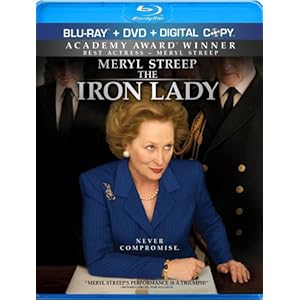One realization that came to me while watching the excellent movie "Downfall," the German movie about the final days of Adolf Hitler, was that while the Nazis were plotting evil throughout Eastern Europe, they were holding galas and balls, feasts, parties, revelries. A mid-level person could have been swept away in it, and not realized until later all of the evil that had gone on. Adolf Hitler is said to have always been able to win arguments in conversation. He won over the room, and from there, we got WWII.
That's an extreme case, but it can universally apply to any political system. Party politics is about convincing the people in the room. It's about showmanship, about projections of strength. People see reality on the ground in accord to their own ideology, some never let reality on the ground shake their convictions.
The movie glosses over the policies of Ms. Thatcher and I'm okay with that. She was the head of political party. Her story isn't about how she saved Britain. No, there are business executives to thank for that (if true, Britain doesn't seem to be doing too hot right now). Her story is about how she won over the room.
When it does do that. A significant part of the movie depicts Ms. Thatcher in her old age, and that is where it goes off track. There is nothing wrong with criticisms of a leader. I found Oliver Stone's movie W. to be pretty compelling. But here, they show her at her weakest -- really, when any human being is weakest, at the end of her life and in retirement. It's okay if you do that briefly, like the Titanic. In this movie, the old age segments are the bulk of the movie. They are the touchstone of the plot, and they make up between 1/3 to 1/2 of the movie.
No matter how you feel about a leader, this is simply not how to depict him or her. No one's life is about their end. You life is about your prime and what you do in your prime. The filmmakers really should be ashamed of themselves for what they've done.


No comments:
Post a Comment